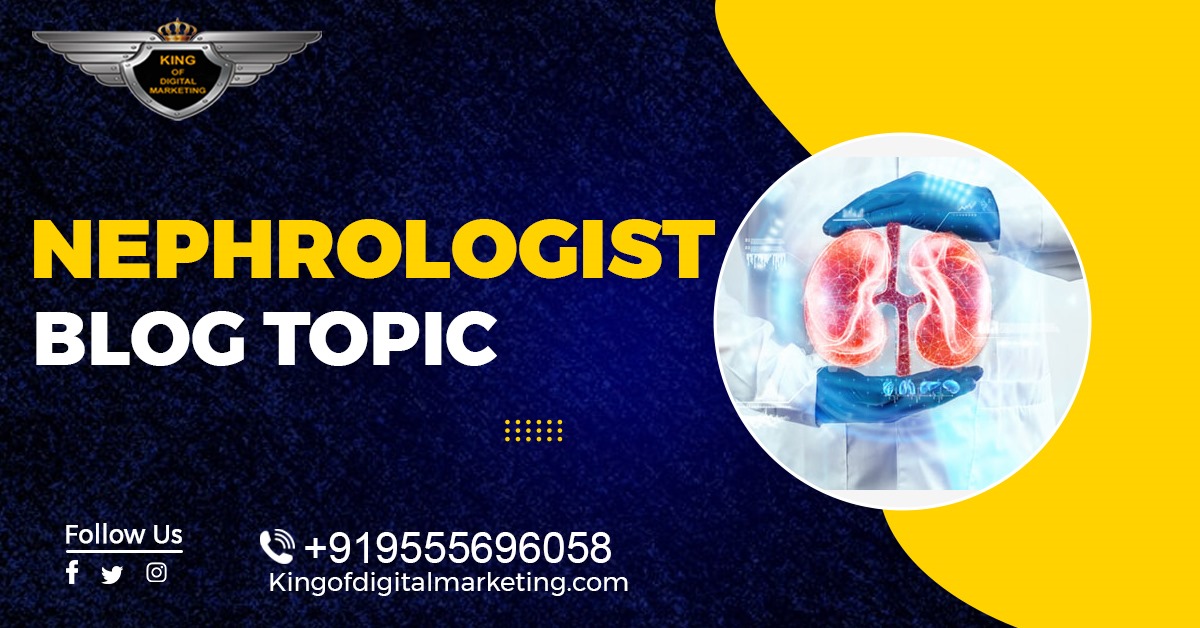Top Blog Ideas For Nephrologist: Nephrologist Blog Topics


TABLE OF CONTENT
Importance of Writing Blogs on Your Website for Nephrologists
Writing blogs on a nephrologist's website can benefit the medical practice and its patients. Here are several reasons why blogging is important for nephrologists:
1. Patient Education:
Blogs provide an excellent platform for nephrologists to educate their patients about kidney health, various kidney diseases, treatment options, and preventive measures. Informative content can help patients better understand their conditions and make informed decisions about their health.
2. Promoting Healthy Lifestyle Habits:
Nephrologists can use blogs to promote healthy lifestyle habits that support kidney health, such as proper hydration, a balanced diet, regular exercise, and avoiding harmful substances like tobacco and excessive alcohol. Providing practical tips and advice encourages patients to adopt healthier behaviors.
3. Explaining Medical Procedures and Treatments:
Complex medical procedures and treatments related to kidney health can be explained in detail through blogs. This helps demystify medical jargon and clarifies what patients can expect during diagnostic tests, dialysis, transplant procedures, and other treatments.
4. Addressing Common Concerns and FAQs:
Blogs allow nephrologists to address common concerns, questions, and misconceptions that patients may have about kidney health and related conditions. This helps alleviate anxiety, provides reassurance, and fosters trust between patients and their healthcare providers.
5. Sharing Research and Advances in Nephrology:
Nephrologists can use blogs to share the latest research findings, medical breakthroughs, and advancements in the field of nephrology. This keeps patients informed about potential new treatments, technologies, and approaches to managing kidney diseases.
6. Raising Awareness About Kidney Health:
Blogs help raise awareness about the importance of kidney health, common kidney diseases (such as chronic kidney disease, kidney stones, and kidney failure), risk factors, and symptoms. Increased awareness can lead to early detection and intervention, ultimately improving patient outcomes.
7. Building Trust and Credibility:
Consistently publishing high-quality, informative content demonstrates expertise and commitment to patient care. This helps build trust and credibility with both current and prospective patients, positioning the nephrologist as a reliable source of information and healthcare services.
8. Encouraging Patient Engagement:
Blogs can encourage patient engagement by inviting readers to leave comments, ask questions, and share their experiences. This fosters a sense of community and allows patients to interact with their healthcare providers outside of traditional clinical settings.
9. Improving Search Engine Visibility:
Regularly updating the website with fresh, relevant content can improve its search engine optimization (SEO) and visibility. This makes it easier for individuals searching for information about kidney health or nephrology services to find the practice online.
10. Supporting Continuity of Care:
Blogs can complement in-person consultations by providing supplementary information, resources, and reminders for patients to adhere to their treatment plans and follow-up appointments. This supports continuity of care and reinforces key messages discussed during clinical visits.

List of Latest Nephrologist Blogs Ideas
Here are 100 blog topic ideas for a Nephrologist blog:
1.Understanding Chronic Kidney Disease (CKD): Causes, Symptoms, and Treatment Options
2.The Role of Nephrologists in Managing Kidney Health
3.Tips for Maintaining Kidney Health: Diet, Exercise, and Lifestyle Choices
4.An Overview of Acute Kidney Injury (AKI) and Its Management
5.Common Kidney Stones: Causes, Symptoms, and Prevention Strategies
6.The Importance of Regular Kidney Function Tests: What You Need to Know
7.Diet and Nutrition Tips for Patients with Kidney Disease
8.Managing Hypertension to Preserve Kidney Function
9.The Link Between Diabetes and Kidney Disease: How to Reduce Your Risk
10.Understanding Glomerulonephritis: Types, Symptoms, and Treatment Approaches
11.Exploring Polycystic Kidney Disease (PKD): Causes, Symptoms, and Management
12.The Impact of High Blood Pressure on Kidney Health
13.Pregnancy and Kidney Health: What Expectant Mothers Need to Know
14.Medication Management for Patients with Kidney Disease
15.Tips for Preventing Kidney Infections (UTIs)
16.Recognizing the Signs of Kidney Failure and When to Seek Medical Help
17.Dialysis Options for Patients with End-Stage Renal Disease (ESRD)
18.The Role of Immunotherapy in Treating Kidney Disorders
19.Understanding Nephrotic Syndrome: Causes, Symptoms, and Treatment Approaches
20.Lifestyle Modifications to Slow the Progression of Kidney Disease
21.An Overview of Kidney Transplantation: Eligibility Criteria and Procedure
22.The Importance of Adequate Hydration for Kidney Health
23.Herbal Remedies and Supplements for Kidney Health: What Works and What Doesn't
24.Pediatric Nephrology: Common Kidney Conditions in Children
25.How Stress Affects Kidney Health and Strategies for Stress Management
26.Traveling with Kidney Disease: Tips for Safe and Enjoyable Trips
27.Understanding Electrolyte Imbalances and Their Impact on Kidney Function
28.The Benefits of Exercise for Patients with Kidney Disease
29.Exploring Alternative Therapies for Kidney Health: Acupuncture, Yoga, and Meditation
30.Tips for Managing Chronic Pain in Patients with Kidney Disease
31.Genetic Testing for Inherited Kidney Disorders: What You Need to Know
32.The Role of Inflammation in Chronic Kidney Disease
33.An Overview of Autosomal Dominant Polycystic Kidney Disease (ADPKD)
34.Mental Health and Kidney Disease: Addressing Depression and Anxiety
35.Preparing for Dialysis: What Patients Need to Know
36.The Impact of Smoking on Kidney Health and Tips for Quitting
37.Living Donor Kidney Transplantation: What Donors and Recipients Should Expect
38.The Role of Palliative Care in End-stage Kidney Disease
39.The Benefits of Home Hemodialysis for Patients with ESRD
40.Managing Fluid Intake and Output for Patients with Kidney Disease
41.The Link Between Obesity and Kidney Disease: Strategies for Weight Management
42.Understanding Renal Artery Stenosis: Causes, Symptoms, and Treatment Options
43.Exploring the Connection Between Heart Disease and Kidney Health
44.Managing Anemia in Patients with Kidney Disease: Treatment Approaches and Risks
45.The Impact of Alcohol Consumption on Kidney Health: Risks and Guidelines
46.Coping with Fatigue and Weakness in Patients with Kidney Disease
47.The Role of Palliative Care in Improving Quality of Life for Patients with ESRD
48.The Importance of Sleep for Kidney Health and Strategies for Better Sleep
49.Managing Bone Health in Patients with Kidney Disease: Prevention and Treatment
50.Understanding the Effects of NSAIDs and Pain Medications on Kidney Function
51.Exploring Herbal Medicine in Nephrology: Benefits and Risks
52.The Role of Nutritionists and Dietitians in Managing Kidney Disease
53.Managing Electrolyte Imbalances in Patients with Kidney Disease
54.The Impact of Chronic Kidney Disease on Mental Health and Well-Being
55.Pediatric Kidney Transplantation: Challenges and Success Stories
56.An Overview of Renal Tubular Acidosis: Causes, Symptoms, and Treatment
57.The Importance of Regular Exercise for Patients on Dialysis
58.Managing Hypertension in Patients with Kidney Disease: Lifestyle Modifications and Medications
59.Exploring Uremic Toxins: Effects on Health and Strategies for Removal
60.The Role of Telemedicine in Nephrology: Remote Monitoring and Consultations
61.An Overview of Autosomal Recessive Polycystic Kidney Disease (ARPKD)
62.The Link Between Sleep Disorders and Kidney Disease: Causes and Treatment Options
63.Exploring Kidney Cancer: Types, Symptoms, and Treatment Approaches
64.The Role of Vasculitis in Kidney Disease: Diagnosis and Management
65.Tips for Managing Fluid and Electrolyte Balance in Patients with Kidney Disease
66.Understanding Cystinuria: Causes, Symptoms, and Treatment Approaches
67.An Overview of Lupus Nephritis: Symptoms, Diagnosis, and Treatment
68.The Benefits of Group Therapy and Support Groups for Patients with Kidney Disease
69.Pediatric Kidney Stones: Causes, Symptoms, and Treatment Approaches
70.The Role of Hormones in Kidney Function and Health
71.Exploring Hepatorenal Syndrome: Causes, Symptoms, and Treatment Options
72.The Impact of Chronic Kidney Disease on Fertility and Pregnancy
73.An Overview of Alport Syndrome: Causes, Symptoms, and Treatment
74.The Role of Intensive Care Nephrology in Managing Critically Ill Patients
75.Exploring the Link Between Diabetes and Kidney Disease: Prevention and Management Strategies
76.An Overview of Bartter Syndrome: Causes, Symptoms, and Treatment Approaches
77.The Role of Genetics in Kidney Disease: Screening and Counseling
78.The Benefits of Exercise Rehabilitation Programs for Patients with Kidney Disease
79.Exploring the Connection Between Kidney Disease and Cardiovascular Health
80.An Overview of Henoch-Schonlein Purpura (HSP) Nephritis: Causes and Treatment
81.The Role of Nutrition Support Teams in Managing Malnutrition in Patients with Kidney Disease
82.Understanding Thrombotic Microangiopathy: Causes, Symptoms, and Treatment
83.Exploring Kidney Biopsy: Indications, Procedure, and Risks
84.The Benefits of Music Therapy and Art Therapy for Patients with Kidney Disease
85.An Overview of Fanconi Syndrome: Causes, Symptoms, and Treatment Approaches
86.The Role of Palliative Care in End-of-Life Care for Patients with Kidney Disease
87.The Impact of Environmental Toxins on Kidney Health: Risks and Prevention Strategies
88.An Overview of Medullary Sponge Kidney: Causes, Symptoms, and Treatment
89.The Role of Integrative Medicine in Complementing Traditional Nephrology Care
90.Exploring Membranous Nephropathy: Causes, Symptoms, and Treatment Approaches
91.An Overview of Gitelman Syndrome: Causes, Symptoms, and Treatment
92.The Benefits of Mindfulness-Based Stress Reduction for Patients with Kidney Disease
93.Understanding IgA Nephropathy: Causes, Symptoms, and Treatment Options
94.An Overview of Nephrogenic Systemic Fibrosis: Causes, Symptoms, and Treatment
95.The Role of Palliative Care in Symptom Management for Patients with Kidney Disease
96.Exploring the Connection Between Kidney Disease and Mental Health Disorders
97.An Overview of Minimal Change Disease: Causes, Symptoms, and Treatment
98.The Role of Patient Education Programs in Empowering Patients with Kidney Disease
99.The Benefits of Yoga and Meditation for Patients with Kidney Disease
100.Understanding Secondary Hypertension: Causes, Diagnosis, and Treatment Approaches
Contact Us To Promote
Nephrologist Business:-  +91 9821918208
+91 9821918208
Join Best Digital Marketing Course
Popular
India's Best PPC Company in Delhi

Do You Want to Run Paid Ads in Google, Facebook, Instagram? Get Best PPC Services in Delhi at Lowest Packages. Must Read
Off Page SEO Latest Techniques

Are you curious to Know the Latest Trends of Off-page SEO. Here is the latest Off Page SEO Techniques to create backlinks. Must Read
Want to Hire An SEO Freelancer?

Hire India's Best SEO Freelancer and Digital Marketing Consultant: Gaurav Dubey to Grow Your Business With Result Based SEO, SMM, PPC, Lead Generation Services. Know More About Gaurav Dubey
Join Best Digital Marketing Institute In Delhi
Agency Based Digital Marketing Course for Fully Practical Session. Students Can Make Career in Digital Marketing and Get a Job Ready in 90Days. Business Person Can Grow Your Business Learning Digital Marketing and Working Professional Can Upgrade His/her Profile.



